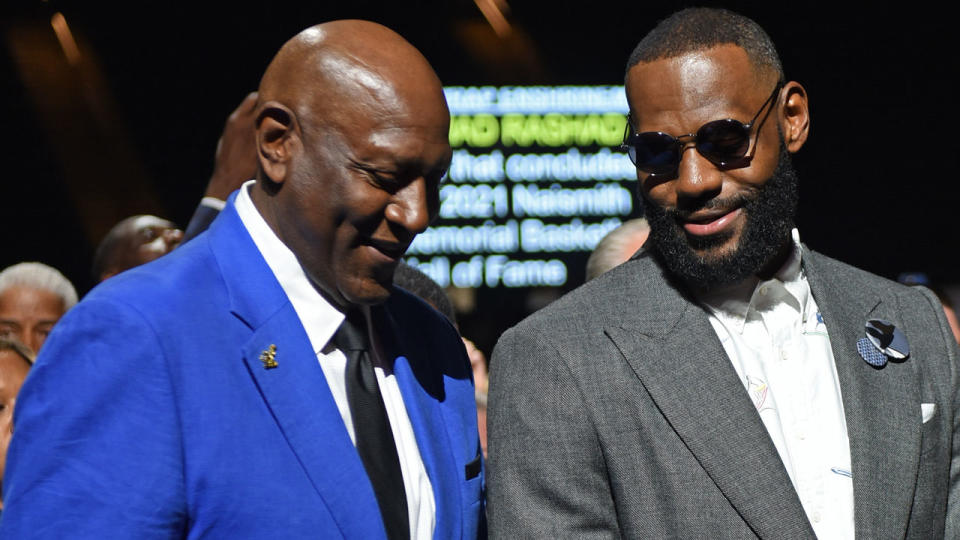Spencer Haywood still seeking rightful place in NBA history decades later

Haywood grandfathered in today's NBA, paved way for young stars originally appeared on NBC Sports Bayarea
Programming note: Watch "Race in America: A Candid Conversation" on Tuesday, April 4 at approximately 5:30 p.m. PT before "Warriors Pregame Live" on NBC Sports Bay Area.
A man with hundreds of male grandchildren he has never met sits in his Las Vegas home wondering if those youngsters and those who pay them millions will ever properly recognize his influence, much less appreciate his audacity.
“Those guys don’t know who I am,” Spencer Haywood says. “LeBron knows.”
LeBron James knows that Haywood changed the arc of his life before he was born. LeBron knows Haywood's courage altered the landscape of the NBA and, to a degree, all American professional sports.
As a guest on “Race in America: A Candid Conversation” on NBC Sports Bay Area, Haywood discussed his byzantine journey, an upcoming biopic and today’s NBA – and how he is directly responsible for LeBron surpassing Kareem Abdul-Jabbar to become the league’s career scoring leader.
The massive evolutionary leap the NBA made in 1971 traces back to a decision Haywood made as a teenage son of sharecroppers in 1949 Mississippi.
Haywood realized his talent as a teenager; as a 19-year-old junior college star, he was the leading scorer on the gold-medal-winning 1968 Olympic team. But he yearned to free his family from a form of modern-day slavery that included picking cotton. He was 19 years old and longed to play in the NBA, but the league required players to be at least four years removed from their high school graduating class for draft eligibility.
“I was good enough for [the Olympics], to save America,” Haywood says. “‘You’ve got to save America, Spencer.’ I was great in that episode. But when I tried to save my family and myself . . .”
Haywood signed with the American Basketball Association and, as a 6-foot-8 power forward, led the league in scoring and rebounding while being named 1970 Rookie of the Year and Most Valuable Player.
When Seattle SuperSonics owner Sam Schulman signed Haywood to a six-year contract worth $1.5 million in 1971, it was in defiance of the NBA rule. The league filed a lawsuit, and Haywood responded with an antitrust suit. After a District Court in California ruled in his favor, the NBA appealed, after which “Haywood vs. National Basketball Association” was upheld by the Supreme Court.
With the NBA draft open to teenagers and underclassmen, what followed was a stream of talent the likes of which no major team sport ever has experienced.
Among those entering the NBA from high school: Moses Malone, Darryl Dawkins, Shawn Kemp, Kevin Garnett, Kobe Bryant, Jermaine O’Neal, Tracy McGrady, Dwight Howard and James.
Among those leaving college as early entrants: Magic Johnson, Isiah Thomas, Michael Jordan, James Worthy, Dominique Wilkins, Shaquille O’Neal, Jason Kidd, Kevin Durant, Stephen Curry, Anthony Davis and Joel Embiid.
Among the 10 active players on the NBA’s 75th Anniversary team, only Damian Lillard spent four years in college. Among the 24 players on the 2023 All-Star rosters, only Lillard spent four years in college.
More than 80 percent of the players in today’s NBA benefitted from the Haywood Rule. They are his grandchildren, not by blood but by principle.
“Now I’m hoping that the NBA and the NBA Players Association put my name on the ruling,” Haywood says. “They’ve tried to get around it. It is “Haywood vs. the NBA.” It is a U. S. Supreme Court ruling. They’ve called it ‘Early entry.’ They’ve called it ‘Hardship.’ They have called it ‘one-and-done.’ And I’m sitting here. I’m a real person. Why can’t you call it what it is?”
Which brings us to Abdul-Jabbar, a former Lakers teammate of Haywood. When LeBron broke Kareem’s scoring record, Kareem jokingly blamed Haywood because, well, LeBron was allowed to play at 18 – four years before Abdul-Jabbar.
Considering his imprint on the NBA, Haywood hopes to become more than a footnote in history. He noticed how one of his fellow fighters against the powers, baseball’s Curt Flood, who challenged MLB’s antiquated reserve clause, felt it best to leave the country after losing his career and being treated as a pariah. Flood deserved better, certainly from those who benefitted from the trail he blazed.
So does Haywood, who at 73 is not considered an outcast but has not been afforded his rightful place in NBA history.
Thus, the upcoming biopic, “The Spencer Haywood Rule,” which will be produced by TBC Sports Entertainment. It’s partly Haywood’s response to some of the perceived mischaracterizations depicted in HBO’s “Winning Time: The Rise of the Lakers Dynasty.”
RELATED: Warriors' time for loud road victory is now as playoffs loom
Mostly, though, the film seeks to illustrate Haywood’s sojourn from the cotton fields of Mississippi to confronting the NBA to a bout with substance abuse and his marriages, the first of which was to the fashion model Iman.
The primary purpose is to inform.
“The one thing that I hope will happen in this process,” he says, “is that the players will step up and say we want to know who Spencer Haywood is.”
LeBron knows. Kareem knows. Nobody knows better than Spencer.

